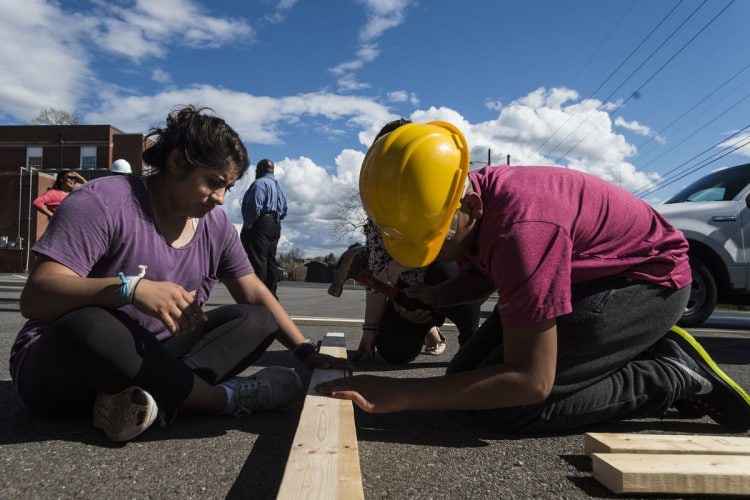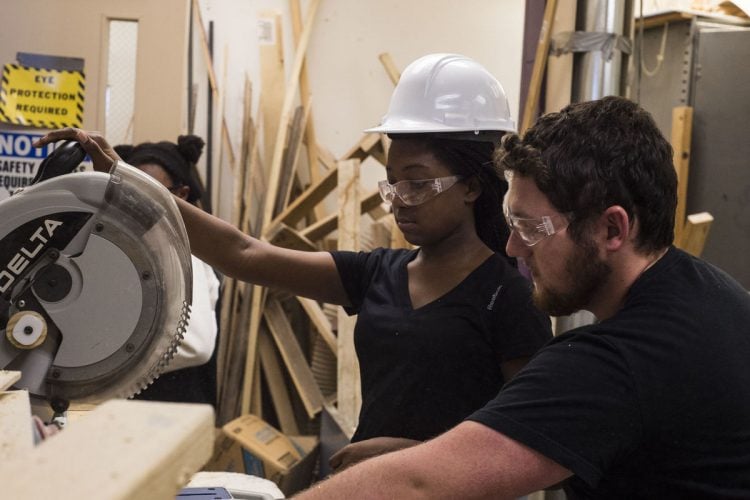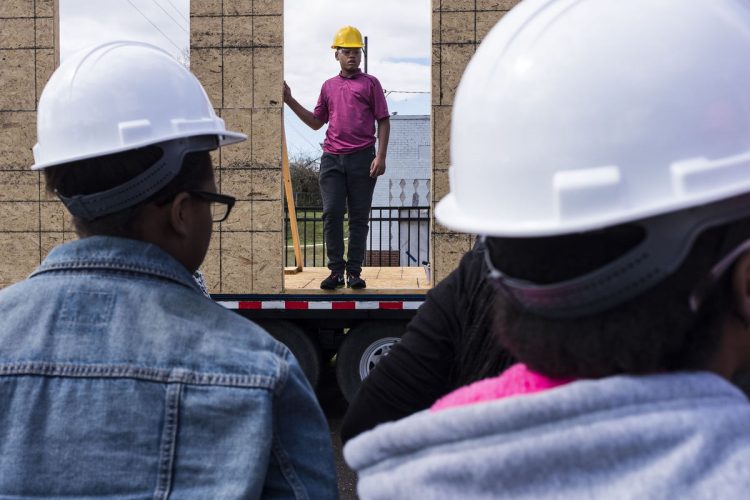Middle school students team with Randolph College mentors to build tiny house

Photo by Lathan Goumas/The News & Advance
By Josh Moody/The News & Advance (reprinted with permission)
A program at Paul Laurence Dunbar Middle School for Innovation has students swinging hammers and stretching tape measures, all in the name of science, technology, engineering, arts and math.
Dunbar students are working to sharpen STEAM skills through the construction of a 20-foot-long and 8-foot-wide tiny house and are working with Randolph College students to do so. An afterschool program funded by a 21st Century Community Learning Centers grant pairs middle-schoolers with students from Randolph who are in a mentoring and leadership class.
The Randolph course, designed for education majors, includes in-class learning and hands-on involvement with construction of the tiny house project.
Randolph students lead lessons on STEAM topics that then can be applied to the construction process. The program is an outgrowth of the Kids in College partnership between Dunbar and Randolph, which has worked with the middle school to improve state Standards of Learning test scores and expose middle school students to college life.
The afterschool program, held Tuesdays and Thursdays at Dunbar, offers students a chance to learn about a wide range of subjects that reinforce other classroom skills and can be applied during the build. This semester, Dunbar students in the program have learned about budgeting, cost analysis, public speaking and job safety and are getting regular math workouts thanks to the constant measuring needed for the build.

Photo by Lathan Goumas/The News & Advance
“We want higher level thinking, we want problem solving; those are skills that every student should know,” said Conseulla Woods, chair of Randolph College’s education department.
Woods teaches Randolph students in the mentoring and leadership course and works with Duane Thomas — grant coordinator for Dunbar — to help facilitate synergy between the class and program.
Thomas, who heads a number of afterschool programs at Dunbar, said the tiny house build is split between two sets of sixth- and seventh-grade students who participate on different days. Thomas said there are about 15 kids at each session, and excitement for the tiny house project is noticeable at Dunbar.
“This is an awesome experience. These kids are going to pass this and say: ‘I helped build that,’” Thomas said.
Dunbar students aren’t the only ones learning new skills both in and out of the classroom — so are Randolph students, said Woods, who explained this build was challenging for both groups of learners.
“Some had never used a tape measure, some had never hammered a nail — some of my college students had never hammered a nail,” Woods said.
Presley Pippin, a sophomore global studies major from Roseland, is the kind of student Woods referred to. Pippin avoided shop class in high school and before this course had never built anything. Now Pippin is learning with Dunbar students as she and her classmates lead them through the project.
But it isn’t just learning how to swing a hammer; Pippin said she’s gaining career skills and insight.
“Working with the kids, I’ve learned a lot about myself, about applying skills and just different ways of teaching,” Pippin said Tuesday as she took a break from the construction of the tiny house.
Woods said students in her mentoring and leadership class had different reactions at the beginning of the semester, when she told them they would be building a tiny house; some students even dropped the course.
“If you’re not willing to work hard, if you’re not willing to think outside the box, this is not the class for you,” Woods said Tuesday as she watched her class work with middle school students on the tiny house.
Dai’Dieon Colmore, a sixth-grade student at Dunbar, said the classroom focus is on how to approach the project. The goal is to give Dunbar students skills inside that apply to the tiny house build outside.
Among the skills being taught are teamwork, communication and how to act safely on a job site, he said.

Photo by Lathan Goumas/The News & Advance
“We’re learning to communicate with each other in order to get this project done correctly and safely,” Colmore said.
He added when the tiny house is finished, he hopes the school can give it away.
“I think we should give it to someone who really needs it,” Colmore said.
His sixth-grade classmate, Imari Patterson, also hopes to give the tiny house away to the needy.
However, as of now, it is undetermined what Dunbar will do with the tiny house when finished.
“Most of them want to give it away to a needy person, which I think is so sweet,” Woods said.
But Woods and Thomas noted grant requirements may prevent such a donation. The 21st Century Community Learning Centers grant, which is funding the construction of the tiny house, stipulates what can and can’t be done with the completed project. Another option may be to auction the tiny house off once construction is finished at the end of the next semester.
“I want that decision to be the middle school’s; I want them to determine what’s most feasible,” Woods said.
Lane May, a junior English literature major from Fredericksburg, said he’s enjoyed working with the middle school students this semester to develop his own teaching and leadership skills.
“It’s not really trying to be the person in charge, it’s trying to be a mentor and guide them,” May said.
This is the 10th year for Randolph’s Kids in College program.
“We want them to aspire to go to college,” Thomas said.
The tiny house project is being built under the supervision of Vince Loudermilk, a career and technical education teacher at Dunbar and independent contractor.
The tiny house project, which is semester based, is scheduled to be completed at the end of the fall semester for the 2017-18 school year. Planning and design began last semester, and construction began this semester. The plan is to complete the exterior by the time the 2016-17 school year ends in August.
Next semester, students will continue their work as they move on to the interior where they will learn about plumbing, electrical work, interior design, and determine what to do with the tiny house once construction is completed.

